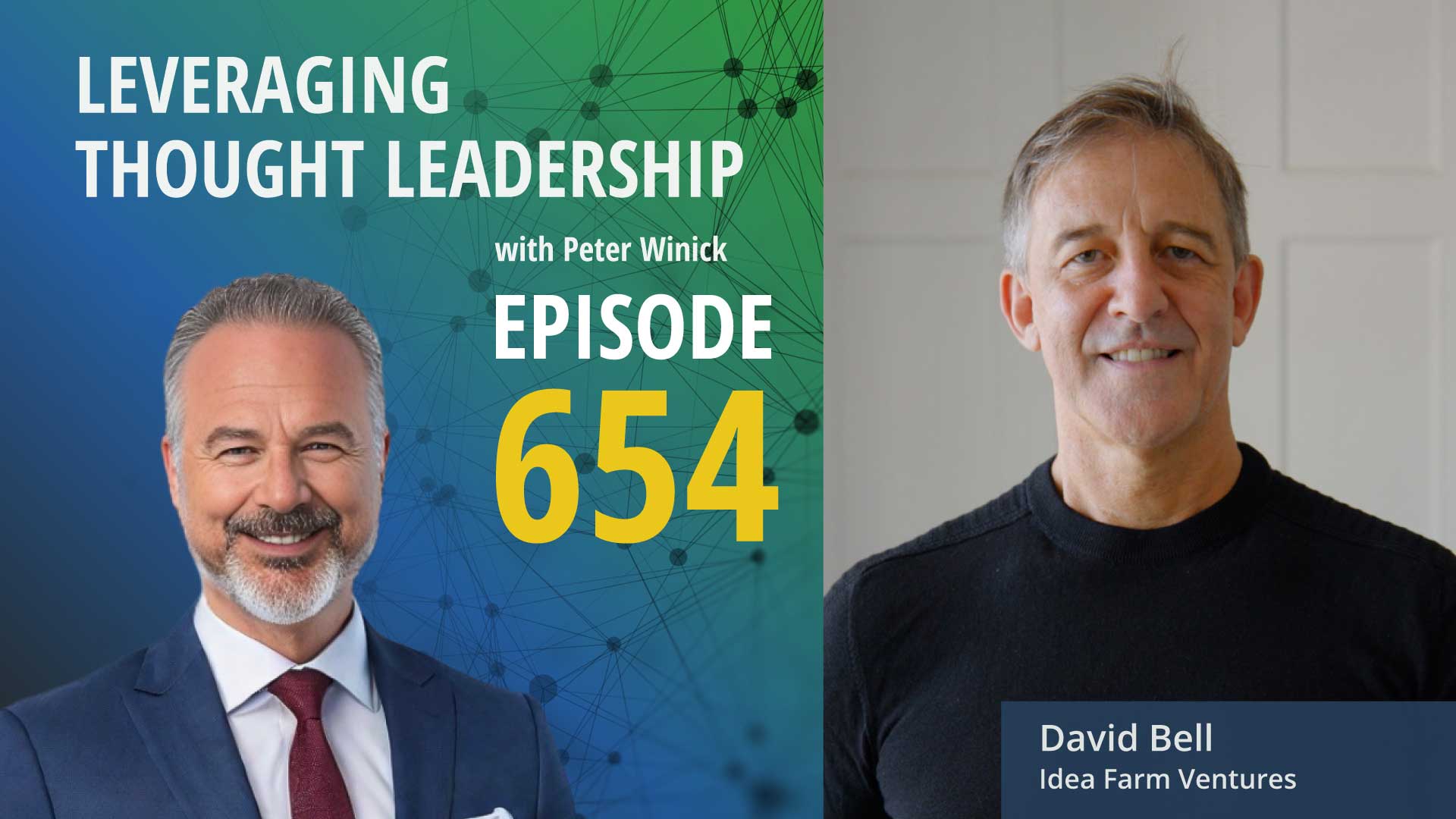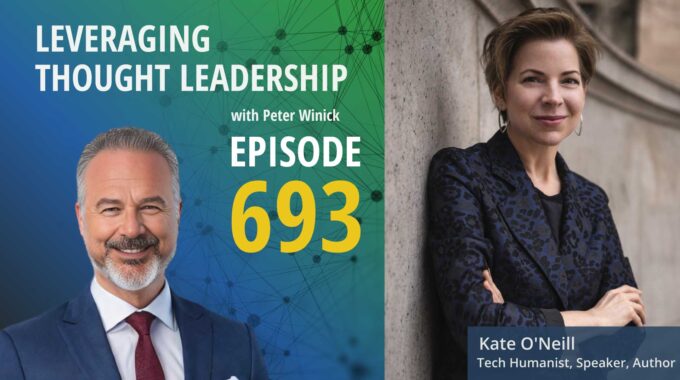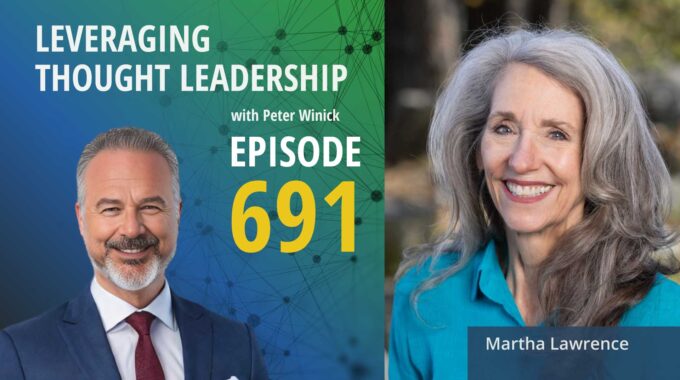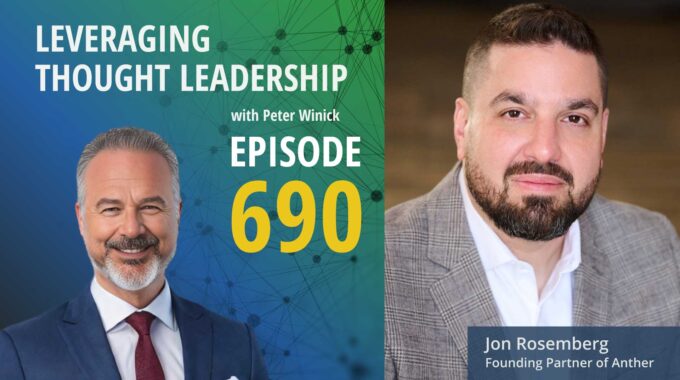Why speed without trust creates risk—and how executives fix it This episode focuses on how…
Execution Eats Ideas for Breakfast: Building Real Businesses from Big Ideas | David Bell

Turning frameworks into funding: The hard truth about scaling thought leadership.
This episode explores how thought leadership becomes a scalable business. It highlights why execution matters more than ideas, how to evaluate market potential, and why many experts are leaving academia to build real-world ventures.
What happens when a top-tier academic walks away from the ivory tower and becomes a powerhouse investor?
Today, Peter Winick sits down with David Bell—former Wharton professor, founder of Idea Farm Ventures, and investor in some of the biggest direct-to-consumer brands you know: Warby Parker, Bonobos, Harry’s, Diapers.com, and Jet.com.
David shares his journey from academia to entrepreneurship, offering real insight into why some thought leaders are drawn to the business world—and how they can thrive there. It’s not just about having ideas. It’s about turning those ideas into scalable, revenue-generating ventures. Execution isn’t optional. It’s everything.
We dig into the frameworks David uses to evaluate whether a business is built for success—or doomed by bad execution. Why do 90% of ventures fail? Why do smart people struggle to build smart businesses? And how can thought leaders avoid the trap of “great idea, poor implementation”?
You’ll hear how David thinks about reinvention, the crumbling edges of higher education, and why thought leaders need more than charisma—they need operational rigor. This isn’t theory. It’s the playbook for transforming thought leadership into a business engine.
Three Key Takeaways
Ideas are easy—execution is everything. Most ventures fail not because of bad ideas, but because of poor execution. Thought leaders need discipline in branding, pricing, and go-to-market strategies.
Academia is no longer the only path. Experts are increasingly leaving universities to apply their knowledge in startups, tech, and corporate innovation roles—where their insights can drive real-world impact.
Strong thought leadership needs a solid business model. Concepts must be packaged into tangible, scalable offerings to succeed—whether that’s products, platforms, or frameworks.
If you found the David Bell episode insightful—especially the focus on turning great ideas into scalable businesses—don’t miss our conversation with Michael McFall, co-CEO of Biggby Coffee. Like David, Michael dives deep into the reality that execution—not just inspiration—is what drives success. He shares hard-earned lessons on building systems, staying aligned with your purpose, and scaling a business without losing sight of your values. Both episodes tackle the tough questions around bringing thought leadership to life in the real world. Tune in to hear how strategy meets sweat equity.
Transcript
Peter Winick And welcome, welcome, Welcome. This is Peter Winick. I’m the founder and CEO at Thought Leadership Leverage. And you’re joining us on the podcast, which is Leveraging Thought Leadership. Today, my guest is David Bell. David’s really interesting. He’s a trailblazer in ecommerce. He is the founder of a company called Idea Farms. He has an academic that’s been published all over. And he’s an investor. And some of the companies that he’s invested in, you’ve probably heard of because They’re direct to consumer brands like Bonobos and diapers.com Harry’s Warby Parker jet.com. So he, he knows a couple of things about a couple of things. So welcome aboard, David. How are you?
David Bell Hey, good. Thanks, Peter. Good to, uh, good to be here.
Peter Winick So you’re kind of hard to put into a category, right? We can say David is an academic, that is true. We can see David investor. That is true, we can say, David’s a CEO. That’s true. But talk about, I guess, how the thought leadership has had a had a role in your work.
David Bell Yeah, thanks Peter. No, I guess I was very fortunate to have a few different bites at the Chariot. I’m sort of by no means in this league, but one of the most interesting people I would speak, you know, it was a couple of years ago at a conference in Germany in Munich called Bits and Pretzels, and it’s all the European sort of startups and tech founders and so on. And it was coincident with Oktoberfest, so they decided on Sunday morning, who are they gonna put on the bill at eight o’clock in the morning on a Sunday during October this was actually Arnold Schwarzenegger. And I think one of the most interesting people you’ll ever hear in terms of three totally different orthogonal careers, you know, bodybuilder, movie star, and then into governor of California, very high level politics, and he’s of course doing other stuff. So yeah, I’m certainly nowhere near that league, but I think this idea of, you know a little bit of reinvention is not a bad thing. And I was very fortunate to get to the United States as a student and go through the American academic system and teach. While teaching, got exposed to early stage consumer investing, which was a bit of a passion and then kind of transitioned into, into doing that full time, but also retaining the academic interest. So I think we all live.
Peter Winick You know, when you think about what it takes to be a successful academic at the places you are, right? We’re talking about significant, reputable places, and then to just sort of move over to the other side as an investor, most academics, quite frankly, I don’t think have the, I don’t t wanna say the courage, but maybe I’ll say the encourage to sort of take that leap because when you get to a certain level in academia, it’s really comfortable. Like it’s, life’s pretty fast. You’re making these on a year. Doing what you love, you know, uh…
David Bell Yeah, no, it’s, uh, that’s certainly true. And I think, you know, in my particular case, you have a very good friend who sort of did it on the front end. He was a professor in finance at UCLA. He did a few years, got married, and then he actually went straight into working as an investment bank. It was very, very successful. And then by the time you got into his mid thirties was effectively able to stop working, at least stop working for other people, but still continue to publish. So, yeah, he’s really one of my best friends and that was always very inspirational to me. I never thought I’d be able to. Carry off something like that. But I think what’s happened, particularly post COVID. I mean, now we’re in this AI world too, like a number of really good friends actually have left academia, left Harvard, left Wharton, left Cornell, uh, and other really good places and gone to start companies. Uh, some of them have sort of at least part time, sometimes full time worked in large corporate. So, you know, Microsoft, Amazon, Google, those kinds of companies now have chief economists and scientists and people who bit naturally out of academia. You know, one of my friends from Stanford, I mean, he was a chair professor at Stanford at the business school and a really great role and he actually also quit now he’s a, he’s, a big shot at Google. So I think people are looking to do other stuff and it’s really a confluence of two things. I think Peter one is there’s just so much more opportunity on the outside for people who’ve been through that academic training. Cause some of it could be potentially quite useful. Number one, uh, and number two, I think academia is also under a lot of pressure now and it, it’s not quite the. Environment that maybe it was, right? There’s all kinds of sources of education. Now I’m taking a class on Coursera along with about 600,000 other people. So I think the traditional university, you know, that model of, you know offline courses and very high fees, sub 10 year basis, that’s under a lot of threat. And if you look at where AI is going, you know, one of the largest sectors that people think is going to evolve is the ad tech sector in all, all kinds of forms. It’s a confluence of all that. It’s still probably a small total number of people. There’s certainly much more common than it was, you know, 10 years ago.
Peter Winick So I want to talk about your thought leadership. You’ve published, you’ve got your own models, your methods and your frameworks. And one of the cool things that I’ve learned from our conversation is the theoretical and the applied, right? So you’ve, you know, it’s one thing to get up there and teach something, but you’re, you’re now invested in companies that we all know, you know, diapers and jets.com and Warby and Harry. So obviously e-commerce, what are the models and the frameworks that you look at when evaluating one of these businesses, because I would argue if you had one or two of those, I could say, eh, maybe Dave is just a lucky fellow, right? I’m gonna go. Well, it’s a little bit more than luck.
David Bell No, I think luck certainly factors into it too, right? You’re just fortunate to be around at places where there are good people. But I think, you know, there’s a couple of things that you look at. So one is, you look whether there’s an opportunity that’s kind of a miserable thing that if you could improve upon it, would people take notice of that? So to take Warby Parking, a very, very successful company, and in some ways, emblematic of that whole space, Peter, the whole direct to consumer. If you go to Google and you type in Warby Parker of, you know, there’ll be a whole list of completions including Warby Parker of Cocklins. You know, so what they did is they said like, you know, people are paying a lot of money for glasses. There’s no reason why they should be $300 other than you and I have got no idea who’s making them. They’re licensed to brands like Tiffany and Dolce and Gabbana and they show up in stores and that’s just kind of what we’re used to. The whole thing’s opaque. Lesley Stahl did a really great 60 minutes segment back in 2012 kind of on this, right? So the first thing you look for is, you know, is this sort of a structural problem with the sector or product? People are getting ripped off the product substandard, you know, diapers.com you’re stressed out. You’re young parents. You really want to go to the supermarket. Well, maybe not everyone does. And diapers, there’s no surprise when it shows up, you know, Pampers are Pampas. You’re not going to be shopping. It’s not like buying bananas, you go online. So you look at that sort of visceral pain point. And then number two, you ask if it’s, if it should pick with us. And then number three, you start to look at the tactical stuff, you know, do the people behind this idea have the right conception of brand, the right conception of go-to-market pricing for value, all of that blocking and tackling. So there’s a statistic I remember from my academic days in a very depressing going 90% of all benches sort of tank and fail. Um, but, but the majority that do Peter, it’s a failure of execution typically more than a failure conception. So sometimes people just have stupid ideas like the Juicera, right? And I don’t know if you remember that was like a terrible product. Uh, Zavri on YouTube went on with the juice bag and squeezed it. It was kind of game over. So at times there were just bad ideas, but I think oftentimes there were just great ideas with sort of bad execution or bad timing. So I’m old enough to remember when, you know, web van was around and it went out of business, but that’s kind of come back, you I remember a company called, what the heck was it, they would deliver you a six pack of beer. Cosmo. Cosmo! Exactly, Cosmo, genius, right? And now you’ve got DoorDash and companies like that that are worth tens of billions of dollars. So sometimes the idea is too early and it comes back. But I think that’s what we’re really looking at is, you know, is this a team that can really execute against what seems to be a pretty fundamental idea?
Peter Winick If you’re enjoying this episode of Leveraging Thought Leadership, please make sure to subscribe. If you’d like to help spread the word about our podcast, please leave a five-star review at ratethispodcast.com forward slash LTL and share it with your friends. We’re available on Apple Podcasts and on all major listening apps, as well as at thoughtleadershipleverage.com, forward slash podcast.
Peter Winick So I want to extrapolate from that because in my work, right, I spend most of my time or a good chunk of my time developing strategies for thought leaders, right? That’s what I get paid to do, right. And I think that the reality is I would say that we do a really good job at that. And I think our clients would say we do a good job at that the execution is the problem. So it’s not just an direct to consumer. You know, ideas are to some degree a dime a dozen, right? You wish you sit around with a, with a couple of cocktails and come up with great ideas to change the world and do this and do that and whatever. But if all we do is wake up in the morning with a headache that we didn’t mean nothing happened there. And I think in the world of thought leadership, it’s almost harder than in e-commerce, CPG stuff, because at least with the commerce here, here’s, you know, I’m holding on my Warby’s, right. I’ve got 10 pairs of them. If the idea is, let’s build a pair of glasses. For a hundred bucks that are stylish and fashionable and don’t look cheap or whatever, whatever. Okay, well, this is a representation, this thing in my hands of what that looks like. I can touch it, I can feel it, whatever, in the world of thought leadership, you can’t put that idea in your hand, right? We could describe it and we could talk about it, but you gotta get it down to the level of detail that says, I’m gonna take my ideas on X, whatever X might be, I’m going to put it into these modalities, validated assessment tool, a video based trend, whatever it is. And I’m going to deliver that at this price point to this market with this, within this period of time. I think a lot of thought leaders don’t put that, or don’t apply that level of rigor to their businesses as someone like you or Sester might. So I haven’t seen that amongst your thought leader friends. Yeah, a little bit.
David Bell Think, um, you know, I really love where you’re going because there’s a, there’s a framework I sort of think about very, very simple, I think speaks to some of these issues called marketing math or business man to one Oh one rights. So defines your success and the success really is the interaction. It’s not additive. It’s like an interaction between how good is your product and then how good is you’ll go to market. And it’s, it’s a really simple exercise, but you think about, you know, when the iPod first came out, I was in Boston, 2003, I’m writing on the tee and I’m wearing the white. It’s in the dial, listening to the silence. People forget around the same time, the Microsoft Zune came out as power. It was basically the same thing. Yeah, but you know, one went on to enormous success. A company that’s worth multiple trillions of dollars. Other companies successful too, but that product tanked. And the tanking is usually not to do necessarily with the quality of the product. And if you build a zero, it’s going to go to zero. But the other side of the equation, the marketing, can you position it properly? Can you go through the right channels? Can you price to value? Can you message it? And it’s much harder to sort of reverse engineer a company that’s been successful because of the nuances of positioning and go to market, that it is a company that’s being successful purely on the basis of a product. And I think, you know, certainly in 2025, it’s hard to be successful just purely on that dimension. So with respect to the short-lived thought leadership, you know, having a simple idea, you have something of that nature that can be unpacked, that’s got immediate tangible value. It’s like, um. You know, probably the most famous, at least at the last half century, more famous business academic would be Clay Christianson at Harvard Business School. Sadly, you know, passed away. But the thing about some of his ideas, like jobs to be done or the innovator’s dilemma, I mean, you could take that idea, you apply it to everything from the government, to the military, to an auto manufacturer, to chip technology. I mean the idea sort of is so fundamental that it’s got one or two simple levers. That if you actually drill down on them, you’ll see success. And it’s very tangible and very implementable.
Peter Winick I think that’s true. And I also think a pattern that I see quite often with thought leaders is they’re brilliant. They’re, you know, many of my clients are literally the best in the world or amongst the best. In the world at what they do. However, when, when you get under the hood of their business, it could often be a mess and I, and I always scratch my head and say, well, why, why is that so, why are these really smart people not sort of following the rules? And then I think about that and go, okay, well this makes a lot of sense, Right. Like if I. If you and I were to sit around and say, we’re gonna open a line of vegan pizza shops in college towns, and we wanna put them next to marijuana dispensaries, because that’ll stimulate, that’s gonna be our model. We say, okay, that sounds cute, right? We can get together a business plan, blah, blah blah. But ultimately, we have to sell that to the investors that says, okay here’s the branding, here’s positioning, here’s this, here is the ROI, Here’s what we’re looking for in locations and we’re going to be in this sort of, you know, college town in, uh, near Penn State, but we’re not going to be near NYU because the real estate is a different structure, whatever. They’re going hold us to that. But thought leaders sometimes put themselves in a predicament where they’re only accountable to themselves. And that’s a bad thing. Cause we couldn’t go back to our investors and say, okay, we took $10 million for you. Our idea was pizza, vegan pizza, college shop next to marijuana dispensaries. And six months later, so, you know, we had a different idea that we executed on its donuts next to Weight Watchers meetings.
David Bell Right. You know, it’s funny, just maybe think of another thing. You know, think about people whose work I admire, who are thought leaders. I think there’s sort of two other things that come to mind as well. This is obviously true, put Frank Christensen or you look at some of those other, you know, really sort of big people. Is there some real underlying research of substance to it? Like it’s not just purely an idea, but there’s empirical findings or faith. So you think about, you now, the long tail by Chris Henderson, We are what water What a great idea. Like anyone who understands the internet’s got to read that book, right? Why the future of business is buying less or more, you know, there’s more stuff, smaller volume and, and all the nuances of that, or, you know, another person I really like as a former colleague and a friend at Wharton is Jonah Berger. He writes about why things take off. And again, if you look at this work, there was always some like real empirical studies underneath. Like why do certain articles get shared in the New York Times? Well, yes, they can all be explained by this. Depth framework, you know, it’s being social currency. I share things with you that make me look cool. And not only is the idea appealing and clever, but there’s actually some real grunt works being done underneath it. Even Michael Porter, you notify forces that I mean, to my recollection, he did real sort of industrial economics, you known, nerd type papers that then lead to this whole
Peter Winick Cause in this market, you know, what’s, I agree with what you’re saying. However, in this. I call it this sort of the steak and sizzle dilemma. There’s a lot of folks out there on social that there’s a lot of sizzle that they’ve got the charisma or the energy or the, whatever it is and it’s magical and whatever you want to believe what they say, right, whether it’s influencers, the thought leaders or whatever. But you know if I were to say, sell David a ruler. And the concept of the ruler is it measures 12 inches each and every time, but then you took it home and sometimes 12 inches was kind of nine inches and sometimes 14, I’m gonna be, my reputation is gonna be hurt and that’s not gonna work all that long. So I think there’s a space in the thought leadership world for that entertainment, feel good, motivational, pump it up, whatever. It’s kind of the Peloton burst or a dopamine hit. You know, but I think you’re right that the hard work And the things that just take time that are held to a research standard, an academic standard, et cetera, and then you build those other things on top of it. Not every, you know, Jonah Berger is a good example of an academic that has a little bit, I don’t say he’s like off the charts charisma, but he’s got enough of it to bring it to life. We can think about some of the rock star academics and Adam Grant, I’d a Christian sin as well, Michael, but you know, there’s some gravitas as well as presence.
David Bell Yes.
Peter Winick Exactly. If a Clay Christensen was coming out today, would his stuff work on social? And I think probably not, because sometimes it takes more than 30 seconds to get a concept and that’s okay.
David Bell Yeah, exactly. But yeah, this could be just sort of a personal preference. It’s just been shaped by my background. But I always have a lot of respect. Another one would be just a great guy, he’s a good friend of mine, Kevin Keller, up at Dartmouth. The Kotler and Keller textbook that Kevin came onto. And Kevin is basically the guy that came up with the concept of brand equity in the 90s. And so that’s a really important practical idea. I mean, every company in the world thinks about that. But the underlying work that he did, and what were the components of brand equity, how would one measure it, how would you leverage it? So to me, I think, it’s actually a great discussion, but it has made me think about my own way of constructing this, but where it’s the combination of it’s accessible and it’s understandable and implementable, but you know that it’s kind of built on something pretty solid, you know? So you pick up Kevin’s book and would help you audit your brand and figure out how to extend it if that was something that you wanted to do. But in doing that, you know that he just didn’t, out of his brilliant head, pull the stuff out. But he spent 10 years doing serious research to get principles right.
Peter Winick Yeah. You know, you mentioned sort of the share of the New York Times articles. The three steps to lifetime success article is going to do better than here’s the article that says you’ve got to work with sleep. Pretty after which article is going to get shared more. You know, unfortunately that’s human nature, right? We were looking for the hack. We’re looking for these ways. We’re living for all that. And I think thought leadership like everything else, you have to put in the reps, right for it to be, for it, to be true, for to be valid. This has been fantastic. What would you say as, as we sort of start to lend the plane here to someone that’s out there today, that’s where you might have been 15, 20 years ago. Rising academic that’s in the middle of things, thinking of going to the dark side. What advice would you
David Bell So my advice would be just to spend time with people who operate in the dark side, you know, go to some conferences that are into sound conferences, you might get involved in. So, you, know, when I was an academic, I would go to the management science conferences. It was great. You see all your colleagues, but really interesting work being done, but it’s all of a very academic type. Whereas if you go to, you like a retail conferences, people who are actually in industry or a startup conference, so you listen to other speakers. So I think just having breadth of interaction. People. Because when you’re an academic, sometimes Peter, you know this as well as anyone. You’re in your bubble. Let’s say you’re at Harvard Business School. That’s a very prestigious place. There’s cool things happening, but there’s actually a whole world outside that. You know what I mean?
Peter Winick What a big academic sometimes forget that is, is that they’re fighting so hard to get that paper, put the next paper, then nine people are going to read. For me of them have the same last name.
David Bell Definitely.
Peter Winick No, well, I think that’s good advice. We appreciate your time. And I thank you for sharing time with us today, David. Thank you.
David Bell Likewise.
Peter Winick To learn more about Thought Leadership Leverage, please visit our website at ThoughtLeadershipLeverage.com. To reach me directly, feel free to email me at peter at Thought Leadership leverage.com and please subscribe to Leveraging Thought Leadership on iTunes or your favorite podcast app to get your weekly episode automatically.





